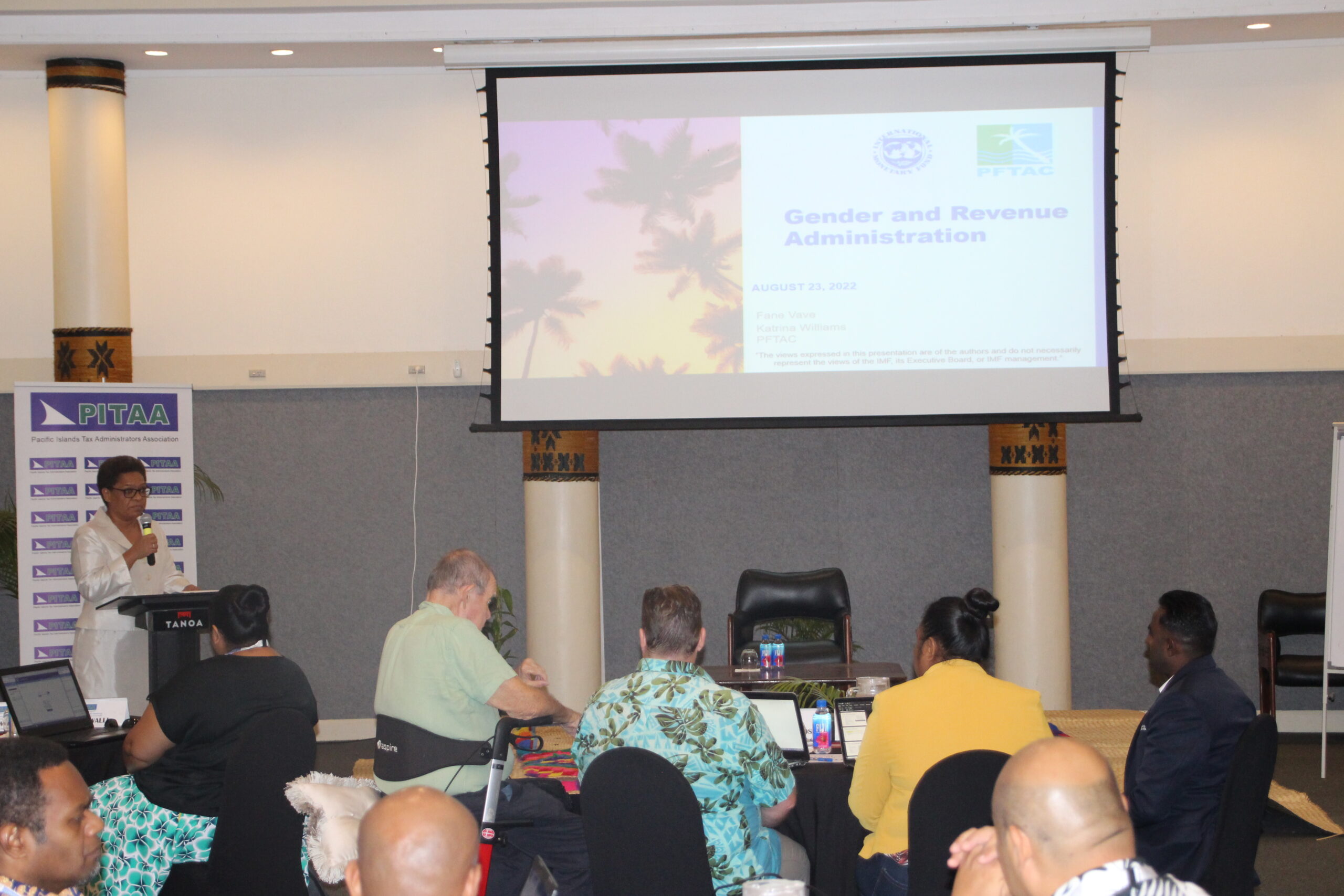
Tax administrations could be enablers of a more gender inclusive economy leading to increased revenue if they encouraged equal participation of all current – and potential – taxpayers.
And they could do this through the way they implement tax laws, design educational programs, assess risk and improved accessibility, according to a presentation by Katrina Williams of the Pacific Financial Technical Centre and Vane Fave of the International Monetary Fund.
Gender inclusion is one of the emerging tax challenges and the issue was discussed at regional level among tax administrations at the Pacific Islands Tax Administrators Association annual meeting in Nadi this week.
“Gender inclusion is important for tax administrations as there is a linkage between increased productivity, revenue collection and economic growth,” PITAA Head of Secretariat, Koni Ravono said. “We are therefore grateful to PFTAC and IMF for hosting a workshop for our tax leaders.”
The workshop aimed to build participants’ understanding of the connection between tax administrations and gender equality as well as ways in which they could be role models for gender diversity – gender balance in the workforce.
Secretariat of the Pacific Community Principal Strategic Lead- Pacific Women, Mereseini Rakuita who also spoke at the workshop said that if tax administrations analysed their data from a gender lens, they would provide a clearer picture on the areas needed to address inequalities and therefore influence the gender agenda in the Pacific.
And that is because tax administrations are sitting on a gold mine of data – some of which may have been collected already but not analysed for gender purposes.
“As a starting point, I would love to look at the sex desegregated data on income levels and concentration of men and women in the different sectors of the formal workforce. From that, we can work to guide our member governments to focus efforts on a certain direction when dealing with women’s economic empowerment,” Ms Rakuita told heads of tax administrations who were in Nadi this week for the Pacific Islands Tax Administrators Association (PITAA) annual meeting.
Ms Rakuita added that tax administrations gender reporting was more “inward” focusing on organisational capacities rather than “outward” towards gender-analysis of tax regimes and policy work around gender responsive tax laws through the Ministry of Finance.
“All organisations are unique, different and face different challenges. Taking a data driven approach is recommended to determine where efforts should be focused, hence the program started with a leadership audit to map where the women are in the organisation,” Ms Rakuita said.
“As a revenue administration, you may have an equal or a greater number of women in your workforce overall, but they may not necessarily be in leadership positions or positions which enables them to contribute to the taking of key decisions which determines the direction of the organisation and its key mandate. You may have certain areas of work that are male-dominated – you have to ask why women aren’t taking up this area of work?”
“The approach taken to improving gender equality and women’s leadership in the workplace needs to be tailored to reflect the specific situation of the organisation. Workplaces can drive change by developing policies and practices that proactively support women and men to equally share care responsibilities and unpaid work, take up senior roles and be economically independent. Workplaces have a key opportunity to counter persistent beliefs and attitudes that perpetuate gender inequality.”
Susan Pritchard, who is in the real estate business, shared her experience saying she was often asked questions that tax officers should already know answers to. And there were also times when various tax officers gave contracting information. But her overall experience with FRCS has been favourable.
Some heads of tax administrations said they really did not think much of gender issues before but that would change now and could be challenging.
As Ms Rakuita reminded them: “Achieving the goal of gender equality is not a straightforward or simple path that can be taken alone or made with a checklist or one-off intervention. It is a process that requires leadership, partnership, transformative approaches, and new ways of working/solutions, improved data, sufficient resources and commitment to foster an enabling policy, budgetary and institutional environment for gender equality.”
Tax Administrations can be Role Models for Gender Equality